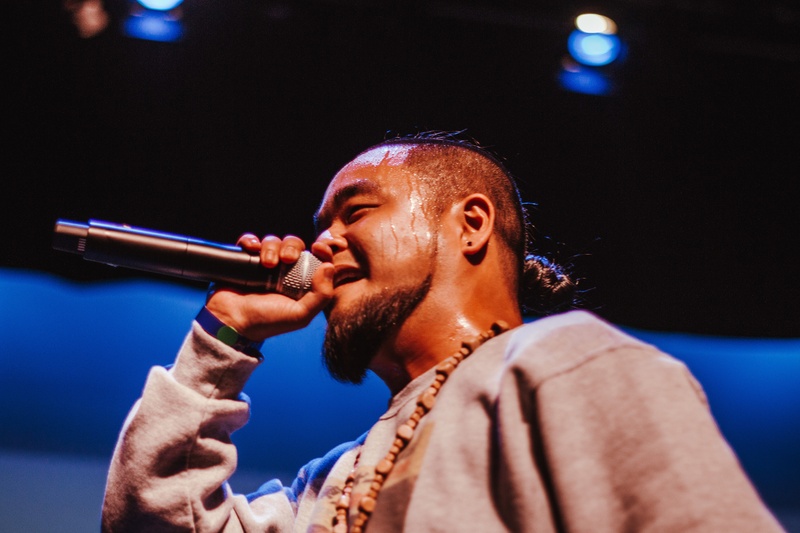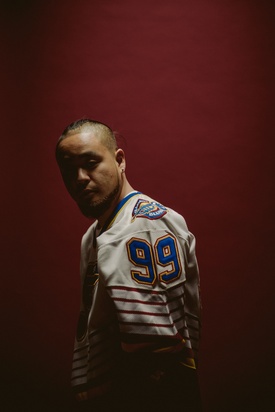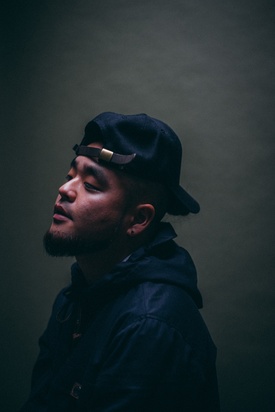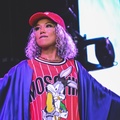When you first hear G Yamazawa you instantly want to bob your head while carefully listening to his astute observations of the world he inhabits. Yamazawa is a talented poet and rapper of Japanese descent, born and raised in Durham, North Carolina. As the youngest child of Japanese immigrants in a predominantly Black and white city, Yamazawa developed a strong sense of selfat a young age. The track, North Cack, is an homage to the placed that raised him. After spending time in a foster home and grieving the death of his best friend, Yamazawa turned to poetry becoming the youngest to win the National Poetry Slam championship. His poetry took him around the country where he toured college campuses to give spoken word performances that explored the inner and outer experiences of growing up the son of Japanese immigrants. Yamazawa is a wordsmith, in addition to poetry he is also an acclaimed rapper. I had the pleasure of meeting with Yamazawa in Los Angeles where we spoke about music, poetry, and family.
The music video for “Dining Room,” from your 2016 self-titled EP, beautifully tells your family’s immigration story. Can you tell me more about your family history? How did you end up in Durham, North Carolina?
The story starts with my mom. Since she was a little girl, she always wanted to learn English, she has a deep love for the language. Growing up in Osaka, my mom was too poor to attend English classes, so she used wake up at dawn to watch a TV program where you could order a booklet for $2 and teach yourself English.
When I visited Japan one of her childhood friends told me that when she used to spend the night over my mom’s house, she would get up early to use the restroom and see my mom watching the TV program trying to teach herself English. My mom is a translator now, by the way.
Then the story goes, my father was a highly ranked long-range rifle shooter in the Japanese defense military--It’s so funny to tell these stories without having verified them.
We have stories like that in my family too.
In the mid-1970s, he tried out for the Olympics but didn’t make the cut, and fell into a depression. He turned to cooking, training with a chef in Japan. One day, he decided he would go to America.
So my dad came to the states, and then went back to Japan for a visit and met my mom. Her family had heard that there was this guy who had just come back from America, and was returning soon. Since she had always wanted to go to America, she decided to go with him.
This is fascinating to hear because so much of what you’re telling me sounds very similar to the Issei experience in the early 20th century--of the first Japanese immigrant men who came to the U.S., many later went back or sent for wives. But that was a century ago, more or less.
I heard that my parents could have been the last of the generation who immigrated to the U.S. under those circumstances.
Your parents’ story is almost anachronistic, it comes later but is reflective of that early immigration pattern.
So your parents went straight to Durham?
Actually, my dad was working as a cook at a restaurant in Florida, apparently he was being held against his will. The owner of the restaurant somehow had his passport and wouldn’t give it back. So my dad was stuck there for a hot minute. Eventually he got his passport back, and a co-worker helped him get a job in Durham, so my parents dipped up to Durham. My mom got a job as an assistant teacher at Duke University in Japanese Studies. That’s when they decided to plant roots in Durham. In 1986, my parents opened up their first restaurant.
Where there any other Japanese families in Durham?
No, there were no other Japanese families. No Japanese restaurants. It was just the two of them and then later us, including my older sister and I. Durham had pockets of immigrant communities, but none were Japanese.
Can you walk me through a typical day for you growing up in Durham?
I had a bit of a tumultuous upbringing. I was a pretty rambunctious kid, and my father was very strict, scary even. A traditional Japanese father. I am a third generation Nichiren buddhist on both sides. As a child, it was very confusing, I think it’s part of human nature to want to understand the truth about things. When you are a kid, especially, your sense of curiosity is through the roof.
Sometimes instead of hitting me for misbehaving my dad would make me chant for an hour to two hours. So religion became ingrained in me as a disciplinary practice. Being in the South, we lived in a rural part of town, there was a lot of churches. And seeing this added to my sense of being different.
I never had trouble making friends, I was blessed with a good smile. In elementary school, we used to have a lot of land, 13 acres, this is the height of my parents American Dream.
But my life drastically changed in 5th grade. I went to foster care for about three months because of my dad. When I came back, my father was diagnosed with Leukemia. It was a difficult time.
Being in foster care, opened my eyes to a world where a lot children are suffering, a lot of families are broken, it gets much worse. I feel grateful it wasn’t worse. It was around this time I fell in love with dancing, writing, and drawing.
Then in 2004 my friend, Lizzie Knowles, passed away in a car accident. She was my best friend and neighbor. After her passing I started writing very seriously. I always had dreams of performing, I always wanted to entertain people.
I’m sorry for your loss. That is a terrible thing to experience especially at that age. It sounds like you were able to channel your grief into your writing. When you started writing seriously were you writing in English only?
I am bilingual, I speak English and Japanese but I don’t read or write in Japanese.
Do you rap in Japanese?
Buri Buri, is the first song I ever wrote and recorded in Japanese. I put it out in early 2018, it has two Japanese features on it, MIYACHI and Pablo Blasta. I hope to rap more in Japanese, but it is difficult. My vocabulary is limited and my grammatic sensibilities are limited as well, but I am able to experiment more sonically. It’s a double edge sword.
I have a strong voice, and I can flow. But I do have to make compromises when I rap in Japanese. It pains me because I can’t be as clear and powerful in Japanese as I am in English.
That is a powerful statement, sums up much of what the children of immigrant parents feel. It’s universal. I know you’ve visited Japan many times. Can you tell me about your experiences?
I went several times as a kid. I have fond memories of these trips but not enough to feel Japanese. Then in 2014 I went for the first time by myself, and again in 2017. After that I started travelling more frequently to Japan. I made Japanese friends, got in contact with Japanese artists, musicians, rappers, beat makers, DJs, and learned about cholo shit in Japan.
I realized they are really rooting for me in Japan, and I have a unique position here in the US, as a Japanese person specifically.
And also growing up in the South, and now living in LA; movement has been very much a part of your story and your family’s history.
This last trip to Japan was probably one of the most important trips because I was there with both of my parents for the first time. Seeing them in Japan made me realize how much they gave up, what they left behind, how they were able to become who they are, and how far they were from their families for so long.
I just didn’t know I could love my parents anymore than I already did.
* * * * *
G Yamazawa’s sound is a poetic mix of Japanese and American sentiments sonically infused with a Southern Black aesthetic, it is the sound of the Japanese diaspora.
Check out more of G’s work here.
© 2019 Sonia C. Gomez






